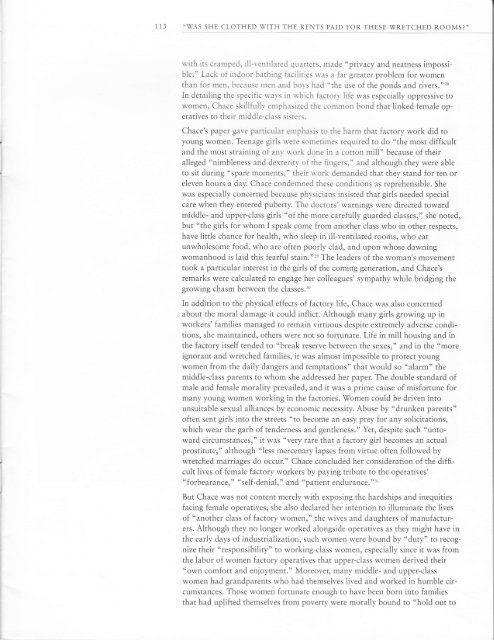Untitled - Rhode Island Historical Society
Untitled - Rhode Island Historical Society
Untitled - Rhode Island Historical Society
Create successful ePaper yourself
Turn your PDF publications into a flip-book with our unique Google optimized e-Paper software.
113 ".S7AS SHE CLOTHED NflITH THE RENTS PAID FOR THESE'STRETCHED ROOMS?"<br />
\\'ith its cramped, ill-r'entilated quarters, made "privacy and neatness impossible."<br />
Lack of indoor bathing facilrties l,vas a far greater problem for women<br />
than for men, because men and bols had "the use of the ponds and rivers."28<br />
In detaiiing the specitic rvavs in rvhich factory life was especially oppressive to<br />
women, Chace skillful1v emphasized the common bond that linked female operatives<br />
to their middle-class sisrers.<br />
Chace's paper gave particular emphasis to the harm that factory work did to<br />
young women. Teenage girls were sometimes required to do "the most difficult<br />
and the most straining of any r,vork done in a cotton mill" because of their<br />
alleged "nimbleness and dexterin of the fingers," and although they were able<br />
to sit during "spare moments," their r,r'ork demanded that they stand for ten or<br />
eleven hours a day. Chace condemned these conditions as reprehensible. She<br />
was especially concerned because physicians insisted that girls needed special<br />
care when they entered puberty. The doctors' warnings were directed toward<br />
middle- and upper-class girls "of the more carefully guarded classes," she noted,<br />
but "the girls for whom I speak come from another class who in other respects,<br />
have little chance for health, who sleep in ill-ventilated rooms, who eat<br />
unwholesome food, who are often poorly clad, and upon whose dawning<br />
womanhood is laid this fearful stain."2e The leaders of the woman's movemenr<br />
took a particular interest in the girls of the coming generation, and Chace's<br />
remarks were calculated to engage her colleagues' sympathy while bridging the<br />
growing chasm between the classes.30<br />
In addition to the physical effects of factory life, Chace was also concerned<br />
about the moral damage it could inflict. Although many girls growing up in<br />
workers' families managed to remain virtuous despite extremely adverse conditions,<br />
she maintained, others were not so fortunate. Life in mill housing and in<br />
the factory itself tended to "break reserve between the sexes," and in the "more<br />
ignorant and wretched families, it was almost impossible to protect young<br />
women from the daily dangers and temptations" that would so "alarm" the<br />
middle-class parents to whom she addressed her paper. The double standard of<br />
male and female morality prevailed, and it was a prime cause of misfortune for<br />
many young women working in the factories.'Women could be driven into<br />
unsuitable sexual alliances by economic necessity. Abuse by "drunken parents"<br />
often sent girls into the streets "to become an easy prey for any solicitations,<br />
which wear the garb of tenderness and gentleness." Yet, despite such "untoward<br />
circumstances," it was "very rare that a factory girl becomes an actual<br />
prostitute," although "less mercenary lapses from virtue often followed by<br />
wretched marriages do occur." Chace concluded her consideration of the difficult<br />
lives of female factory workers by paying tribute to the operatives'<br />
"forbearancer" "self-denialr" and "patient endurance."tt<br />
But Chace was not content merely with exposing the hardships and inequities<br />
facing female operatives; she also declared her intention to illuminate the lives<br />
of "another class of factory women," the wives and daughters of manufacturers.<br />
Although they no longer worked alongside operatives as they might have in<br />
the early days of industrialization, such women were bound by "duty" to recognize<br />
their "responsibility" to working-class women, especially since it was from<br />
the labor of women factory operatives that upper-class women derived their<br />
"own comfort and enjoyment." Moreover, many middle- and upper-class<br />
women had grandparents who had themselves lived and worked in humble circumstances.<br />
Those women fortunate enough to have been born into families<br />
that had uplifted themselves from poverty were morally bound to "hold out to











